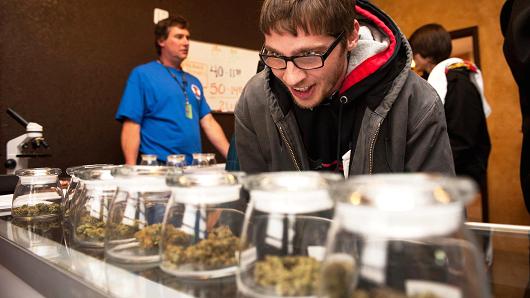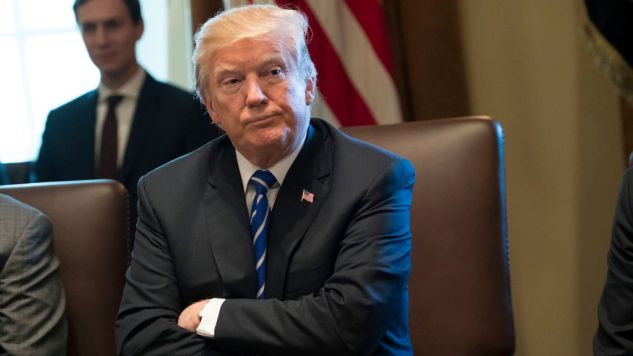If President Donald Trump reverses state laws legalizing marijuana, he could cripple if not bankrupt those states.
Last month I gave the keynote address at the Cannabis World Congress Business Expo in New York City. CWCBExpo is the trade show for the cannabis industry. I had the pleasure of meeting thousands of like-minded cannabis activists, and the experience was truly refreshing and inspiring on many levels.
I learned firsthand that those in the legal cannabis industry — whether they’re growing hemp, medical marijuana or recreational marijuana in California or Oregon or wherever — have formed a united front. Everyone at the convention was looking to work together to come up with solutions on how to get the federal government to move forward and embrace this industry, which has grown exponentially.
When it comes to economics, let me put the state of marijuana to you in this way: If Trump reverses state law, he’ll be crippling if not bankrupting the states that have legalized marijuana. Not only will this action go against the will of the people who voted for legalized marijuana, this action will cause yet another economic collapse. And no, that isn’t an exaggeration.
Over half of the states have now legalized marijuana in some way and multiple states are receiving millions, soon to be billions, in tax revenue from this industry. When those states no longer have this tax revenue coming in (tax revenue that is projected to increase steadily each year), where will that money come from?
Think about it this way: The auto industry was bailed out with roughly $80 billion from taxpayer money, but it is still here, and the industry was able to repay taxpayers overtime. We’re talking about making a profitable, multibillion-dollar industry go away overnight. Meaning America’s president will voluntarily make hundreds of thousands of Americans unemployed overnight. How many will default on their mortgages? How many will declare personal bankruptcy?
A report by New Frontier Data states the marijuana industry is projected to create a quarter of a million jobs by 2020 — that’s more jobs than the manufacturing industry, utilities, or government jobs, according to the Bureau of Labor Statistics. Prior to the 2016 election, the marijuana industry, which existed in 25 states at the time, was worth a combined $7.2 billion. Now, this industry is expected to grow at a compounded annual rate of 17 percent, with medical marijuana sales growing from $4.7 billion in 2016 to $13.3 billion in 2020. Adult recreational sales (recreational use is only available in eight states) are expected to go from $2.6 billion in 2016 to $11.2 billion by 2020.
“If Trump reverses state law, he’ll be crippling if not bankrupting the states that have legalized marijuana. Not only will this action go against the will of the people who voted for legalized marijuana, this action will cause yet another economic collapse.”
Colorado alone has a $1.3 billion marijuana industry and much of the tax money is going toward scholarships so students can go to community colleges for free. This isn’t “found money” either. Before marijuana was legal, this money was going to the black market, to the drug cartels. Now it’s being used to fund college scholarships. Let that sink in for a minute. In the Denver metro area, marijuana tax dollars are being used for infrastructure. Imagine that. We don’t need to rely on false presidential promises to fix our local roads and bridges. The town of Edgewater is spending $1.4 million in marijuana tax revenue to repave streets and replace their city hall with a new building that includes a police station and library.
To be successful, American cannabis business owners have to stay up-to-date on new laws and regulations — that means many are spending their time fighting against unjust laws and regulations, all while running a company with their own capital. This entire industry is unable to get a bank loan or set up a bank account due to federal law. When you can’t rely on a bank to even store your money, you’re wearing more hats than any other small business owner or entrepreneur.
If federal law doesn’t change by the time Canada legalizes marijuana nationwide in 2018, just watch our neighbors to the north find a way to get their banking system on board for American cannabis businesses. And get ready for American cannabis businesses to go to Canada, or at least set up a headquarters there. Many are already going to Puerto Rico, where the IRS Tax Code 280E doesn’t apply. Don’t know what that is? Well, you know how businesses can deduct expenses on their taxes? If you’re working with marijuana, you can’t deduct anything because of 280E. Of course, there’s also Mexico. Our neighbors to the south just legalized medical marijuana, so who knows how many American researchers will be crossing the border to study this plant.
The president doesn’t have the power to overturn votes
If someone ran a successful, legal business that could be taken away at any time because President Trump felt like it, then yes, that person would probably consider moving to another country to survive. But that’s not what I discussed at the CWCBExpo. I didn’t plead with these businesses to make as much money as possible and then use that money to get the hell out before it’s too late. That’s not the united front the American cannabis industry is after. These are hopeful, optimistic business owners who have watched cannabis laws slowly change in their favor, and they’re doing all that they can to work with lawmakers and educate citizens to continue that trend. This American industry is looking not just to make history but to make America a better place for generations to come. Their tax money is making a significant difference in their local communities — how many of us see our taxes directly contribute to anything worthwhile (and by worthwhile I mean schools, roads, libraries — not foreign wars).
The cannabis industry is about innovation as much as it is about fighting against oppression. That’s the American way. And it’s all of our jobs as American citizens to remind the federal government what that means: When we the people vote to legalize something, we legalize it. The president doesn’t have the power to overturn our votes. Our faltering economy needs the American cannabis industry to continue to grow and succeed. It’s really that simple. Why we’re even debating this is beyond me.
credit:420intel.com













